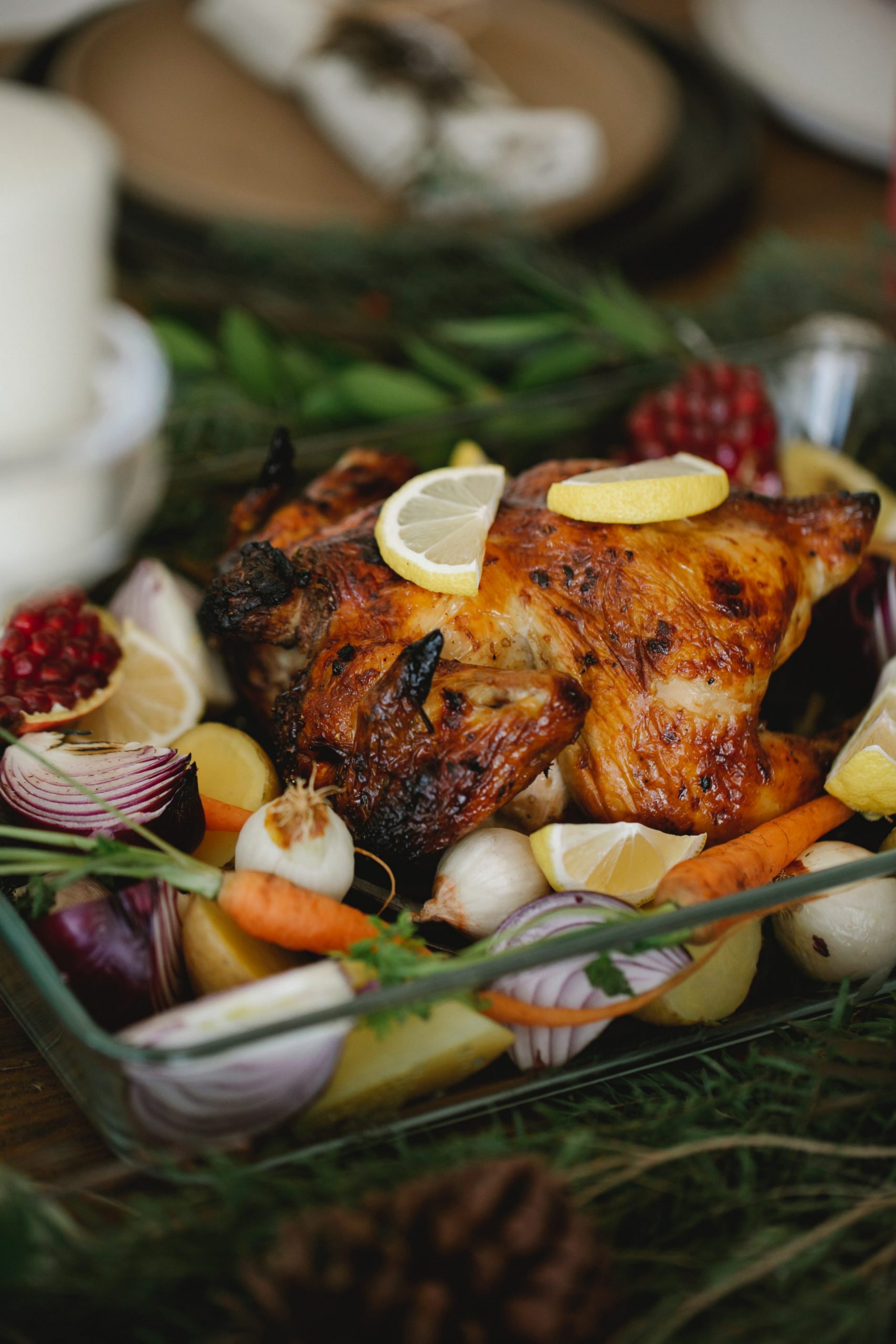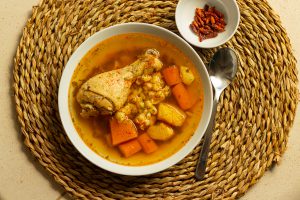
- Readers Rating
- No Rating Yet!
- Your Rating
Food for winter illnesses
Illnesses are more common during this season of the year due to weather conditions and social interaction in enclosed spaces. Here are the foods for the most common winter illnesses:
Common cold
Colds are mainly caused by viruses, such as the rhinovirus, and are more frequent in winter due to the greater congregation of people in enclosed spaces. Typical symptoms include nasal congestion, sneezing, sore throat and coughing.
- Vitamin C: Foods rich in vitamin C, such as citrus fruits, strawberries, kiwis and peppers, can help strengthen the immune system.
- Zinc: Sources of zinc, such as lean meat, nuts and seeds, can help shorten the duration of colds.
Influenza (flu)
Influenza is a contagious viral illness that tends to be more active during the winter months. Symptoms include fever, muscle aches, fatigue, cough and congestion, and can be more severe than the common cold.
- Antioxidant-rich foods: Consuming a variety of vibrantly coloured fruits and vegetables provides antioxidants that can support the immune system.
- Lean proteins: Lean meats, fish and legumes provide proteins that are essential for immune function.
Bronchitis
Bronchitis is an inflammation of the bronchial tubes that can be caused by viral or bacterial infections. Symptoms include persistent cough, sputum production and shortness of breath.
- Foods rich in antioxidants and vitamin C: These nutrients can help reduce inflammation and strengthen the immune system.
- Hot soups and broths: Hot chicken broth can provide relief and nutrients when you have respiratory infections.
Pneumonia
Pneumonia is a lung infection that can be caused by a variety of agents, such as bacteria, viruses or fungi. Symptoms include high fever, cough with sputum, shortness of breath and general malaise.
- Protein-rich foods: Eating lean proteins such as chicken, turkey, fish, eggs and legumes can aid in the recovery and repair of lung tissue.
- Antioxidant-rich foods: Fresh fruits and vegetables, especially brightly coloured ones, provide antioxidants that can aid in recovery.
Norovirus
This virus is responsible for outbreaks of gastroenteritis and is most common in winter. Symptoms include vomiting, diarrhoea, abdominal pain and dehydration.
- Probiotics: Yoghurt and other probiotic foods can help maintain a healthy balance of bacteria in the gut, which is important for digestive health.
- Hydration: Drinking enough water is essential to prevent dehydration during gastrointestinal illnesses.
Tonsillitis
Throat infections, such as tonsillitis, can be more common in winter. Symptoms include sore throat, fever, difficulty swallowing and swollen glands.
- Soft, easy-to-swallow foods: During a bout of tonsillitis, you can opt for bland foods such as mashed potatoes, yoghurt, soups and smoothies.
- Hydration: Drinking warm fluids such as herbal tea or water with honey and lemon can provide relief for a sore throat.
Ear infections
Ear infections, especially in children, can increase in winter. Symptoms can include ear pain, fever and temporary hearing loss.
- Zinc-rich foods: Foods such as lean meat, nuts and seeds contain zinc, which is important for the immune system and healing.
- Vitamin C: Foods rich in vitamin C, such as citrus fruits and strawberries, can aid in overall recovery.
Cardiovascular disease
Cardiovascular disease can worsen in winter due to vasoconstriction (narrowing of the blood vessels) in response to the cold, which can increase the risk of cardiac events.
- Foods rich in omega-3 fatty acids: Fatty fish such as salmon, walnuts and chia seeds can help maintain a healthy heart.
- Fibre and whole grains: Eating whole grains and fibre-rich foods can help control cholesterol and blood pressure.
To prevent these illnesses, it is important to take steps such as washing your hands regularly, avoiding close contact with sick people, eating a healthy diet, keeping warm in cold weather and getting a flu vaccination if necessary. If you have severe or persistent symptoms, consult a healthcare professional for proper diagnosis and treatment.

Ultimate list of foods for winter illnesses
The ultimate foods to help prevent winter illnesses and keep your immune system strong:
- Citrus fruits: Oranges, tangerines, lemons and grapefruit are rich in vitamin C, which can help strengthen the immune system and fight colds.
- Garlic and onions: These foods contain compounds with antibacterial and antiviral properties that can help prevent infections.
- Ginger: Ginger has anti-inflammatory properties and can help relieve cold and flu symptoms.
- Probiotic yoghurt: Probiotics can improve gut health and strengthen the immune system. Look for yoghurt with live, active cultures.
- Leafy greens: Spinach, chard and kale are rich in vitamins and minerals that can strengthen your immune system.
- Vibrantly coloured fruits and vegetables: Foods such as carrots, sweet potatoes and red peppers are rich in antioxidants and vitamin A, which are important for immune health.
- Nuts and seeds: Almonds, walnuts and chia seeds are sources of healthy fats and protein that can strengthen your immune system.
- Fatty fish: Salmon, sardines and tuna are rich in omega-3 fatty acids, which have anti-inflammatory properties and can improve overall health.
- Chicken broth: Hot chicken broth can help relieve congestion and provide essential fluids and nutrients.
- Eggs: Eggs are a good source of protein and contain nutrients such as vitamin D, which is important for immune health.
- Herbal tea: Drinking hot tea, such as ginger, chamomile or echinacea tea, can relieve congestion and provide comfort when you feel sick.
- Water: Staying well hydrated is essential for overall health and can help prevent dehydration during illness.

Winter recipe: chicken and vegetable soup
Ingredients
- 2 boneless, skinless chicken breasts
- 1 tablespoon olive oil
- 1 onion, chopped
- 2 carrots, peeled and cut into slices
- 2 chopped celery stalks
- 2 cloves garlic, chopped
- 1 red pepper, chopped
- 1 cup chopped green beans
- 8 cups chicken stock (homemade or quality)
- 1 bay leaf
- 1 teaspoon dried thyme
- Salt and pepper to taste
- 1 cup pasta (such as noodles or rice)
- chopped fresh parsley (optional, for garnish)
Preparation
- In a large saucepan, heat the olive oil over medium heat. Add the onion and garlic and sauté until fragrant and lightly browned.
- Add the carrots, celery and red pepper to the pot. Cook for a few minutes until the vegetables begin to soften.
- Add the chicken breasts to the pan and cook for a few minutes until golden brown on the outside.
- Pour the chicken stock into the pot and add the bay leaf and thyme. Bring the soup to the boil, then reduce the heat and simmer for about 20-25 minutes, or until the chicken is cooked through.
- Remove the chicken breasts from the pot and shred into small pieces with a fork. Return the shredded chicken to the pot.
- Add the green beans and pasta to the soup and cook until the green beans are tender and the pasta is cooked according to package directions.
- Season the soup with salt and pepper to taste. Remove the bay leaf.
- Serve the soup hot, sprinkled with chopped fresh parsley if desired. Serve with crusty bread or crackers.
Enjoy this warm and comforting soup during cold winter days!
